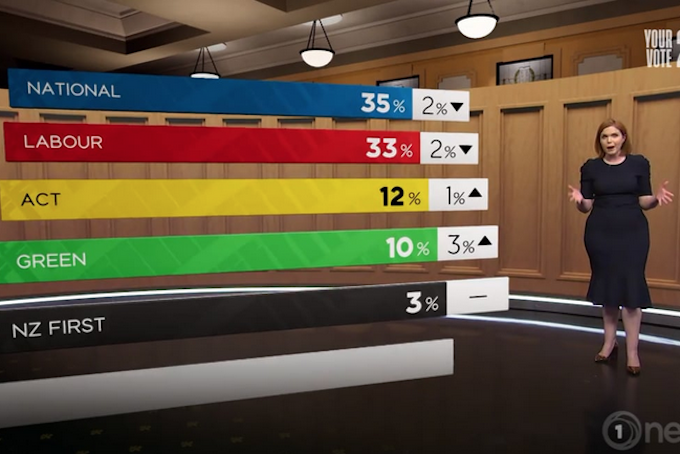
Nothing much changed in a 1News Verian poll released last Monday. However, some commentators treated the boring results as a blank canvas on which to express their creativity.
1News presenter Simon Dallow described the results of the newly named 1News Verian poll on Monday as a harsh verdict on the government.
“It is just under three months until the election and Labour seems to have been dented by a series of ministerial distractions,” he said as he introduced the story at the top of the bulletin.
Despite that effort to dress up the poll as a tough verdict on the government, it was mostly notable for how un-notable it was.
Few parties moved more than the margin of error from the last 1News poll in May, which also showed National and Act with the numbers to form the next government — just. National and Labour both dropped the same amount: 2 percent.
You might have thought the damp squib of a result would put the clamps on our political commentators’ narrative-crafting abilities.
Instead, for some it proved to be a blank canvas on which they could express their creativity.
‘Centre-right surge’
At Stuff, chief politics editor Luke Malpass called the poll a “fillip for the right” under a headline hailing a “centre-right surge”.
One issue with that: the poll showed a 1 percent overall drop for the right bloc of National and Act.
“Fillips” generally involve polls going up not down. Similarly, a drop in support doesn’t traditionally meet the definition of a surge in support.
The lack of big statistical swings wasn’t enough to deter some commentators from making big calls.
On Newstalk ZB, political editor Jason Walls said Labour was plunging due to its disunity.
“All [Chris Hipkins] has been really able to talk about is what’s happening within the Labour Party — be it Stuart Nash, be it other ministers who are behaving badly. Jan Tinetti. Voters punish that. And we’ve seen that from the Nats in opposition. They punish disunity.”
It’s uncertain what National’s equivalent 2 percent drop was down to. Perhaps voters punish unity as well.
Wider trends context
Mutch-McKay’s own commentary was a bit more nuanced, placing the poll in the context of wider trends.
On TVNZ’s Breakfast the day after the poll’s release, she said some people inside Labour couldn’t believe the results hadn’t been worse for the party.
Perhaps that air of disbelief also extended to the parliamentary press gallery.
After all, the commentators are right: Labour has had a terrible few months, with high-ranking ministers defecting, being stood down, being censured by the parliamentary privileges committee, facing allegations of mistreating staff, or struggling with the apparently near-impossible task of selling shares in Auckland Airport.
Maybe a sense of inertia propelled some of our gallery members to keep rolling with the narrative of the last few months, in spite of the actual poll result.
Or maybe part of the issue is that hyping up the significance of these polls is a financial necessity for news organisations which pay a lot to commission them.
“You’ve got to squeeze the hell of it. You’ve paid $11,000 or $12,000 for a poll, it’s got to be the top story. It’s got to be your lead. It’s got to have the fancy graphics,” Stuff’s political reporter and commentator Andrea Vance said recently on the organisation’s daily podcast Newsable.
‘Manufacturing news’
“It just feels like we’re manufacturing news. We’re taking a piece of information that’s a snapshot in time and we’re pretending that we know the future,” she said.
Vance went on to say these kinds of snapshot polls don’t actually tell us all much — but she said long-term polling trends are worth paying attention to.
It’s probably no coincidence then that the most useful analysis of this latest poll focused on those macro patterns.
In a piece for 1News.co.nz, John Campbell noted the electorate’s slow drift away from the centre, with Labour losing 20 percent of the electorate’s support since 2020 and National failing to fully capitalise on that drop-off.
He quoted Yeats line, “the centre cannot hold”, before asking the question: “What do Labour and National stand for? Really? Perhaps, just perhaps, this is a growing section of the electorate saying — you’re almost as bad as each other.”
That sentiment has been echoed by other commentators. In his latest column for Metro magazine, commentator and former National Party comms man Matthew Hooton decried the major parties’ lack of ambition.
“At least Act, the Greens and Te Pāti Māori aren’t insulting you with bullshit. Instead they offer ideas they think will make your life better, even if they’ll never happen. So here’s a better idea than falling for the big scare from National or Labour.
‘Reward ideas-based parties’
“How about using your ballot paper to tell them to f*** off and reward one of the three ideas-based parties with your vote instead?” he wrote.
And on his podcast The Kaka, financial journalist Bernard Hickey and commentator Danyl McLauchlan criticised our major parties for their grey managerialism.
“You kind of have to go back to the mid-1990s when so many people just hated the two major parties because they didn’t trust them,” he said.
“We seem to be going through a similar phase now. The two major parties are just these managerial centrist parties. They don’t have much to offer by way of a vision.”
Maybe it’s a little shaky to say anyone’s surging or flopping on the basis of a couple of percentage points shifting in a single poll.
But if you zoom out a bit, at least one narrative does have a strong foundation — voters saying, to quote Shakespeare this time — “a plague on both your (untaxed) houses”.
This article is republished under a community partnership agreement with RNZ.












































